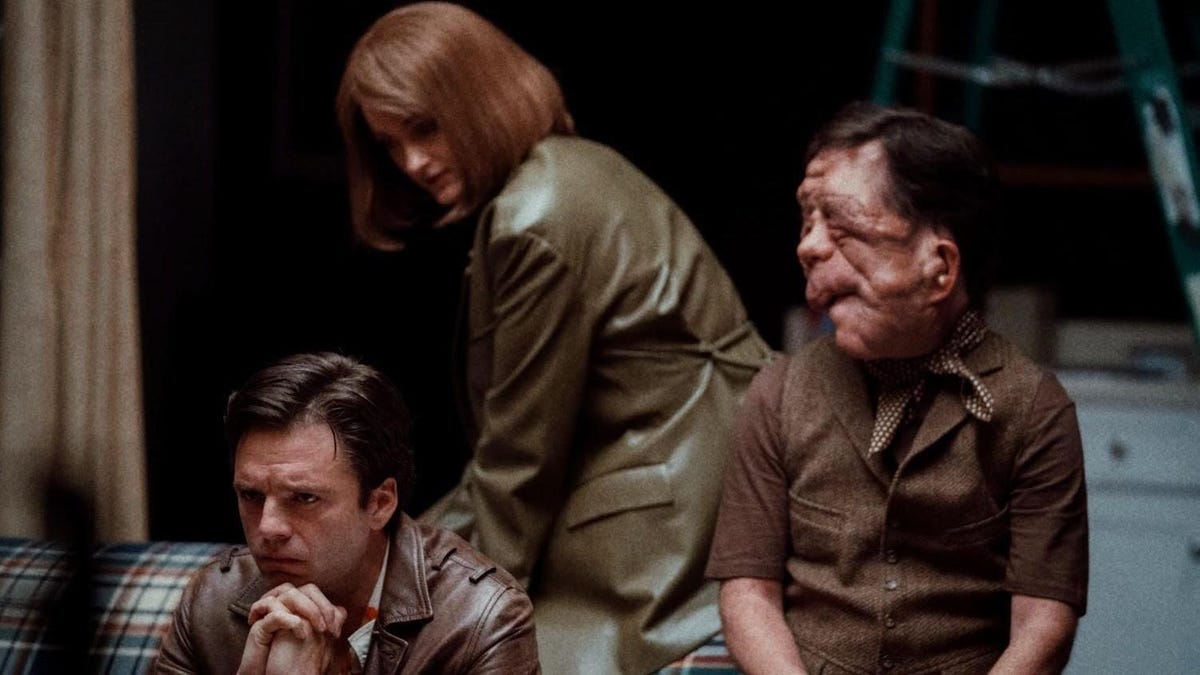It’s easy and appealing to imagine how our lives might be different and better if things were just a little different. A desire for change is the basis for most stories, and the unintended consequences of those wishes are often what makes a plot. These, too, are the basic building blocks of A Different Man, the third feature from writer-director Aaron Schimberg. But his tragicomedy, which name-checks genre classics new and old like The Bluest Eye and Beauty And The Beast, is assured, absurd, and totally unique.
A Different Man follows Edward, a struggling New York actor who lives with neurofibromatosis. The effects of the condition are both psychological—Edward is shy and conflict-avoidant out of fear of how people might react to his face—and practical—his “tumors” will continue to grow, obstructing his sight and hearing. Edward enrolls in an experimental procedure that will cure him without surgery, and, after a lightly Cronenbergian transformation, wakes up one day now looking like (and portrayed by, in quite possibly a career-best performance) Sebastian Stan.
The secret that everyone knows quickly becomes clear—life is easier for the objectively, conventionally attractive. Edward chooses a new name and begins a new life. Relative fame and fortune quickly follow. When he discovers his former neighbor Ingrid (a perfectly high-on-her-own-supply Renate Reinsve) has written a play titled “Edward” about her relationship with who he used to be, he is easily cast—beating out other actors still living with facial differences despite his mediocre audition. His situation is further complicated when Adam Pearson’s Oswald arrives; though he has the same condition Edward once did, Edward’s meekness is matched by Oswald’s confidence and charisma.
It’s a hell of a premise, and it’s one that Schimberg is committed to taking to a 10. His screenplay is deliciously layered, structured around winking callbacks but clever enough to never show its cards or where it’s going. Schimberg is utterly confident in his story, and it’s his tact and taste that keep this story from turning into, say, Shallow Hal. A Different Man acknowledges the vague ethical debate surrounding casting actors with physical differences like Pearson’s. (At a post-screening Q&A, Schimberg shared that he was surprised at some criticism surrounding his casting of Pearson in his previous film Chained For Life; he quipped that for his next, he would cast one natural born actor and one in makeup, and let them battle it out to settle the conflict.) But A Different Man is less concerned with the ethics of representation than with questioning how one’s mindset can affect their life, and blowing that question up.
These themes are present, but A Different Man prioritizes laughs over proselytizing. There is inherent humor in the absurdity of the situation—which takes a momentary detour near sci-fi territory during Edward’s transformation—but Schimberg wrings laughs out of deftly staged awkwardness (though, thankfully, not cringe). Take, for instance, a very funny situation involving an ambulance and an ice cream truck, which drives home how one man’s tragedy is another’s inconvenience. Conversations of life and death are interrupted by apartment repairs. An awkward date ends with the most casually heartbreaking sex scene in recent memory.
Much has been made of the downfall of the big, studio comedy in the past decade, but A Different Man is at home in an emerging trend of dark, surrealist works. The film invokes positive comparisons to Kristoffer Borgli’s 2023 films Sick Of Myself and Dream Scenario—the old-fashioned cursed wish fantasy, fitted to our capitalist, attention economy. While Schimberg skews a bit more empathetic to his characters than Borgli might, none of these films are interested in their characters being victims, nor are they straight punchlines. More often than not, we laugh with Edward—a hell of an achievement, given how many people set out to pity him.
Reviewed as part of Film At Lincoln Center’s New Directors/New Films series.




